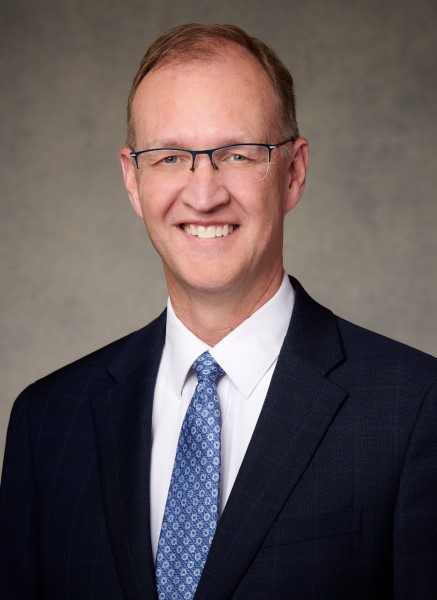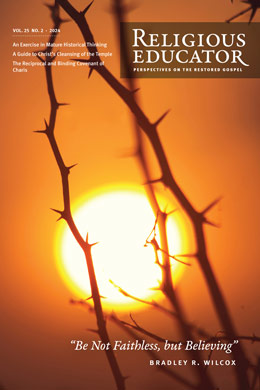Seminary Life Preparation Lessons
Kenneth L. Alford
Kenneth L. Alford, "Seminary Life Preparation Lessons," Religious Educator 25, no. 2 (2024): 65–74.
Kenneth L. Alford (alford@byu.edu) is a professor of Church history and doctrine at Brigham Young University.
 Chad H. Webb. Courtesy of Intellectual Reserve, Inc
Chad H. Webb. Courtesy of Intellectual Reserve, Inc
Abstract: The Church recently announced that seminary classes throughout the world will include “Life Preparation lessons” in their weekly curriculum. In the following interview, Chad H Webb explains how and why these lessons were developed, expectations for them, and their importance in helping meet the needs of the rising generation.
Keywords: seminary, scriptures, missionary work, temples, gospel questions, emotional health, youth
In a January 2024 S&I Annual Broadcast, Chad H Webb, administrator of Seminaries and Institutes of Religion, explained, “It’s imperative that we continue to help our students have confidence in their ability to study and understand the scriptures and to know and live the principles they teach. We will also continue to help youth find answers to their questions through principles of acquiring spiritual knowledge and to gain the benefits of doctrinal mastery.” He then announced that “new topical lessons, referred to as ‘life preparation lessons,’ will also be added to the new curriculum. These lessons will address specific needs of our seminary students in ways that will continue to be Christ centered, scripture based, and learner focused.”[1]
Speaking after Webb, Elder Clark G. Gilbert, Commissioner of the Church Educational System, added, “I’m excited by what Brother Webb shared with you regarding the coming updates to our seminary curriculum. This is a historic development that will elevate the life preparation of youth across the Church.” Then he encouraged seminary teachers to “see the inspiration behind these lessons and recognize the role you will play in preparing your youth for the future that is ahead of them. Pray for insight and inspiration to see their future path. Seek out the conviction to inspire them to prepare. What an amazing time to be teaching seminary, and what a marvelous responsibility we all share.”[2]
Referring to the new Life Preparation lessons later in the broadcast, Elder D. Todd Christofferson said, “I’m particularly excited—intrigued, even—by what Brother Webb has announced regarding thematic lessons in seminary. . . . To me, this seems like adding some extra fruit and a fresh pinch of seasoning to the pie. It’s going to be delicious. With you, I am anxious to learn from this approach, and I rejoice in being able to provide something extra to those who make the effort and sacrifices to be in seminary. Anyway, enjoy the pie!”[3]
In this follow-up interview with Ken Alford, Chad Webb shares insights and information about this exciting new addition to the seminary curriculum.
Alford: What are the new seminary Life Preparation lessons?
Webb: Life Preparation lessons are intended to help students by addressing specific topics and needs for this generation of youth. Like all our curriculum, these lessons are firmly rooted in the scriptures and the teachings of modern prophets—trying to help students draw on the power of Jesus Christ in all aspects of their lives. We hope they will help our students fulfill their divine identity and potential, respond to questions and challenges in their lives, build self-reliance, become more physically and emotionally healthy and resilient, develop skills to succeed in school, prepare for future educational opportunities, prepare for missionary and Church service, and prepare to make and keep covenants in the temple.
Alford: What led to the development of the Life Preparation lessons?
Webb: A few years ago we tested a new course in seminary. For a semester, we taught first-year seminary students a revised version of the institute course Scripture Study Fundamentals. After one semester, students in those classes were significantly ahead of their peers in their ability to have meaningful personal scripture study and to participate in classroom discussions.
 Young men and women in the Church are remarkable in so many ways. They are the future of the Church. They have extraordinary work to do in their families and in the world. Courtesy of Intellectual Reserve, Inc.
Young men and women in the Church are remarkable in so many ways. They are the future of the Church. They have extraordinary work to do in their families and in the world. Courtesy of Intellectual Reserve, Inc.
At about the same time, a program called “Succeed in School” was having great success in parts of Africa. The program teaches skills to help students do better in school now, as well as help them prepare for future educational opportunities. Elder Gilbert had seen the impact of teaching spiritually anchored life skills in BYU–Pathway and was looking for ways to take learnings from the Innovate Institute initiative into seminary. He began strongly encouraging us to consider what the Lord might be teaching us. While this was happening, discussions began with members of the Missionary Department about what more seminary could do to help better prepare future missionaries. Other discussions were taking place with members of the Temple Department asking similar questions about how we can help first-time temple attenders be more prepared to have a meaningful temple experience and understand the covenants they are making. Still there were other meetings talking with members of the Welfare and Self-Reliance Department about how we can help meet a growing need for emotional resilience and self-reliance. And, at the same time, we were discussing a long-held desire of many to focus more on the teachings of current prophets and other Church leaders.
These Life Preparation lessons came together as a combination of all those conversations. It really felt for me like a lot of people were being inspired, and we just needed to fit all the puzzle pieces together.
As we considered the possibilities, we realized that seminary is in a unique position. We are unique in the world because we can discuss the needs of youth through the lens of the restored gospel—not teaching the same lessons that could be taught by a school counselor or family therapist but addressing the same needs through the teachings of Jesus Christ as found in the scriptures and teachings of modern prophets. We also realized we are unique in the Church simply due to the amount of time we have with seminary students each year.
We’re also in a unique position today. Since aligning our schedule with Come, Follow Me, we’re no longer the only ones teaching the seminary book of scripture. Individuals, families, and Sunday School as well as the Young Men and Young Women organizations are studying the same book of scripture at the same time. Given that synergistic environment, we wondered if it might be possible to carve out a few days here and there to address specific needs of the youth.
Alford: What topics are included in the Life Preparation lessons?
Webb: After consultation with our Commissioner, Elder Gilbert, and the Executive Committee of the Board of Education, we worked closely with several Church departments to identify these categories (and within each category are several specific topics and lessons):
- Finding Answers to My Questions
- Scripture Study Skills
- Teachings of Church Leaders
- For the Strength of Youth
- Building Self-Reliance
- Physical and Emotional Health
- Preparing for Future Education and Employment
- Succeeding in School
- Missionary Preparation
- Temple Preparation
Alford: What guidance did you receive from the Board of Education about these lessons?
Webb: The Board of Education is enthusiastic about this change. But they want to make sure we continue to be rooted in the restored gospel as taught in the scriptures and modern revelation.
The S&I Curriculum Team is writing the lesson plans in collaboration with other Church departments—including Welfare and Self-Reliance, Missionary, Temple, Priesthood and Family, and Church Education.
Alford: What trial programs contributed to these new Life Preparation lessons?
Webb: The Correlation Research Division designed a study that took place from January to April 2023, during which both called and released-time teachers taught sample Life Preparation lessons in different parts of the world.
The Correlation Research Division has also planned a study associated with the soft rollout in 2024 as released-time seminary teachers are using some Life Preparation lessons. Both teachers and students are providing feedback on their experiences. So far the response has been very positive. Students have felt the topics are relevant and the lessons are helpful. The pilot tests have also provided formative research to help inform and improve the curriculum design.
Alford: What are your expectations for these new lessons?
Webb: We believe that with this change we can assist parents and Church leaders to enable the most prepared missionary workforce in the history of the Church, prepare a generation of youth who are ready to understand the covenants of the temple and deepen their commitment to keep them, a generation who knows how to study the scriptures and love and follow the teachings of living prophets—a generation of emotionally resilient youth who have the skills and capacity to succeed in school, who can lead in the Church and their communities and be prepared to be righteous fathers and mothers. Our hope is to prepare disciples of Jesus Christ who are deeply converted to him and his restored gospel throughout their lives.
Alford: Will the Life Preparation lessons be standardized worldwide?
Webb: The Life Preparation Lessons are standardized throughout the seminary program worldwide. However, local adaptations will be made according to school schedules and some local needs and opportunities.
We will add one to two lessons each week for topical study, and we will have three to four lessons a week teaching the scriptures sequentially as outlined in the Come, Follow Me calendar.
We will teach the same categories and topics annually, but most of the lessons will be different every year, focusing on different specific topics and scriptural references. Also, the “Teachings of Church Leaders” lesson materials will vary each year.
The Life Preparation lessons began in January 2024 for released-time programs, with about one Life Preparation lesson per week. There will be a global rollout in January 2025 with all the lessons being taught.
Alford: What would you like seminary teachers to know about preparing and teaching these new lessons?
Webb: Every learning experience in seminary should help accomplish the objective of seminaries and institutes. Every lesson should be Christ centered, learner focused, scripture based, and guided by the Spirit. Whatever the topic is for a given day, the hope is to point our students to Jesus Christ and see how his teachings and example help them with their questions and challenges. Seminary teachers are not being asked to become therapists or counselors. Their central role is still to teach and testify of Jesus Christ and his gospel. I hope they will do that each day in the scriptures—just as we have always done.
Another thing I hope seminary teachers remember is that these lessons were written by many people, including those from other Church departments, and after considering research results from the Correlations Research Division of the Church. Those efforts led to the categories chosen and the number of lessons selected. So even a topic that might seem less interesting for one teacher may be very valuable for certain students. Staying close to the curriculum when it comes to teaching each topic and questions of pacing will be important.
Another reason to stay close to the curriculum is that, like all seminary curricula, the Correlation Department of the Church has carefully reviewed the Life Preparation lessons for doctrinal accuracy and appropriateness. The lessons are designed to be a simple, gospel-centered approach to the topic they address, not a comprehensive course on the subject. If teachers are experienced in a certain topic, they may feel that important ideas have been left out. But I hope they will be very cautious about adding something that is not already included. I hope teachers will use the curriculum as a foundation for the learning experience they provide—to help themselves stay focused on gospel principles and provide the appropriate focus on those principles.
Lastly, I hope we remember our role as seminary teachers. Students may share with a teacher a challenging situation they face. When that happens, a teacher’s role is to direct them to their parents and priesthood leaders who can guide them to the help they need. If the challenge involves abuse, I hope teachers will follow the guidance provided in the Seminaries and Institutes Emergency Response Guide.
Alford: What would you like seminary students to know about these new lessons?
Webb: I hope our students know that we are doing this because we love them and want to help them. We want seminary to help deepen their faith in Jesus Christ. We also want to help meet their needs by teaching them to draw on the power of Jesus Christ in all parts of their lives—not just spiritually, but emotionally, mentally, academically, and temporally.
Alford: What would you like parents of seminary students to know about these lessons?
Webb: These new lessons provide students with a framework to help them navigate their daily, very real challenges. Parents should feel comforted knowing that these lessons will be taught through the lens of the restored gospel—not teaching the same lessons that might be taught by a school counselor or family therapist but addressing the same needs through the teachings of Jesus Christ as found in the scriptures and teachings of modern prophets. Our hope is that these lessons will be so helpful that all parents will want their children to attend seminary.
Alford: Likewise, what would you like stake presidents, bishops, and youth leaders to know?
Webb: We hope seminary will become even better at supporting what they are doing to bless their youth. We hope these lessons will help students better prepare to be effective and happy missionaries, better prepare for and understand the covenants of the temple, know how to study the scriptures and love and follow the teachings of living prophets, be more emotionally resilient, have the skills and capacity to succeed in school, be prepared to lead in the Church and their communities, and become righteous fathers and mothers.
Alford: What closing thoughts would you like to share?
Webb: We love these seminary students. They are remarkable in so many ways. They are the future of the Church. They have extraordinary work to do in their families and in the world. We hope we can help them to prepare for that. Most of all, we hope we will help them deepen their conversion to Jesus Christ and know that Heavenly Father wants to help them in every aspect of their lives.
Notes
[1] Chad H Webb, “Spiritual Anchor” (S&I Annual Broadcast, January 26, 2024), https://
[2] Clark G. Gilbert, “Speak, Lord; for Thy Servant Heareth,” (S&I Annual Broadcast, January 26, 2024), https://
[3] D. Todd Christofferson, “Trust in God,” (S&I Annual Broadcast, January 26, 2024), https://
